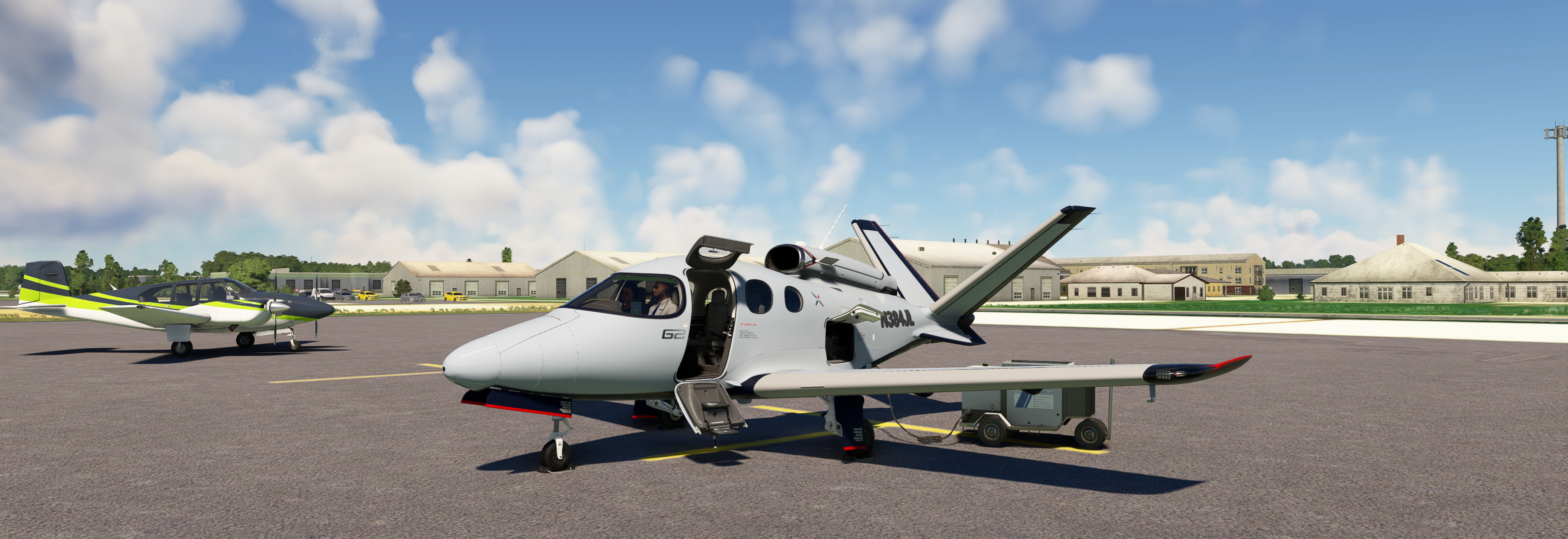Cirrus Vision Jet SF50
The Cirrus Vision SF50, also known as the Vision Jet, is a single-engine very light jet designed and produced by Cirrus Aircraft of Duluth, Minnesota, United States. After receiving deposits starting in 2006, Cirrus unveiled an aircraft mock-up on 28 June 2007 and a prototype on 26 June 2008.
- Unit cost: 1,960,000–1,960,000 USD (2013)
- Range: 1,266 mi
- Top speed: 345 mph
- Weight: 3,706 lbs
- Engine type: Williams FJ33
- Number of seats: 6
- Cruise speed: 345 mph
Information below via EvoJets.com
Cirrus Vision Ownership Overview
The Cirrus Vision is a unique aircraft in the very light jet market, and people notice the second they lay eyes on it. Operated on a single engine and a V-tail, this aircraft is designed unlike any other. Buyers drawn to the idea of operating a jet that’s a first of its class will centralize their focus when they find a Cirrus Vision for sale.
Cirrus Vision Cabin Experience
The Cirrus Vision is capable of transporting 4 people and 1 crew member, as since it’s a very light jet, it can be operated by a sole pilot. The fuselage is about 30ft long and the cabin is 12ft. The wingspan reaches further than that of the fuselage to nearly 40ft. This aircraft offers a typical amount of passengers an upgraded, comfortable, and extended-range ride compared to that of its competition.
Total cabin space is 170 cubic feet, allowing for a width of 5ft and a height of 4ft. The entry door is 4ft high and baggage is allotted 25 cubic feet of space through an external compartment.
Cirrus Vision Mission Profile
Customers who buy a Cirrus Vision are focused on shorter hops between destinations, carrying a smaller amount of passengers, and often flown by the owner themselves. This aircraft took a long time to produce and through that, Cirrus was able to spend ample time improving and fine-tuning the jet towards the customers awaiting the arrival, nearly 600 once deliveries actually began.
This jet is popular among buyers as it’s extremely cheap when compared to competitors, thus opening an outlet to many as it’s dubbed an “affordable” private jet. An added aspect the Cirrus Vision brings to the table is it’s parachute capability, a system called CAPS, that Cirrus is known so well for. Buyers looking for an enhanced safety system will find just that with the Cirrus Vision.
Buy or Sell a Cirrus Vision with evoJets
Are you interested in Cirrus Vision ownership? evoJets can help. Don’t waste hours on public listing engines with outdated photos, vague information, and placeholders for prices.
Our experienced reps can wade through the fragmented Very Light Jet Sales market and help you buy, sell, trade, or lease your Cirrus Vision with efficiency. With over a decade of experience in business aviation charter and ownership, we have the off-market aircraft sales connections and industry knowledge to put you on a path to success.
Call evoJets today and speak to an aviation expert: (877) 970-5387.
Cirrus Vision Cost to Own
Acquisition cost for the Cirrus Vision typically ranges from $1.9-$2.0 million, more than $1 million more than competitor Eclipse 500. When factoring in market depreciation to total annual cost, the Cirrus Vision will cost a buyer roughly $770,000 per year compared to the Eclipse 500 which will cost a buyer $828,000-$830,000.
Cirrus Vision Operating Cost
Cirrus Vision direct operating cost is around $700 per flight hour, about $300 less than that of its competitor. Annual fixed cost for the Cirrus Vision falls between $177,000-$179,000, roughly $30,000 less than the Eclipse.
Cirrus Vision Performance Overview
The Cirrus Vision is a bestseller for a reason- its unique design and low price point draws in many, and causes them to stay once they witness the class Cirrus brings to the table. Buyers looking into aircraft for sale will be wowed by this very light jet which they can operate themselves.
Cirrus Vision Engine
The Cirrus Vision houses a single Williams FJ33-5A engine, a feature which decreases the operating cost. The Cirrus Vision has a max cruise speed of 300kts, significantly slower than the Eclipse 500 which has a max cruise of typically 370kts.
The aircraft can land and takeoff in the following field lengths:
- FAR-91: 3,014ft
- FAR-135: 3,768ft
- FAR-121: 5,024ft
Cirrus Vision Payload
Max payload for the Cirrus Vision is 1,200lbs, 100lbs-150lbs more than that of the competition.
Cirrus Vision Range
At long-range cruise, the Cirrus Vision has a range of 1,200nm carrying a typical passenger load. The Eclipse 500 can only reach half of that distance under similar parameters.
Cirrus Vision Specifications
| CIRRUS VISION GENERAL INFO | |
|---|---|
| Aircraft Class | Very Light Jet |
| Aircraft Manufacturer | Cirrus Design |
| Aircraft Year of Manufacture | 2016 – Present |
| CIRRUS VISION FINANCIAL DATA | |
| Acquisition Cost | $1,764,000 – $2,156,000 |
| Variable Cost | $640 – $782/hr |
| Annual Cost | $571,524 – $698,530 |
| Fixed Cost | $17,814 – $160,324 |
| Market Depreciation | $130,000 |
| Retail Charter Rate | $1,700/hr |
| Average Charter Net | $1,239/hr |
| CIRRUS VISION PERFORMANCE DATA | |
| Fuel Burn | 70 gal/hr |
| Max Cruise | 300 kts |
| 135 Landing | 3,768 ft |
| 135 Takeoff | 3,768 ft |
| 91 Landing | 3,014 ft |
| 91 Takeoff | 3,014 ft |
| 121 Landing | 5,024 ft |
| 121 Takeoff | 5,024 ft |
| Max Payload | 1,200 lbs |
| Basic Operating Weight | 3,700 lbs |
| Max Takeoff Weight | 6,000 lbs |
| CIRRUS VISION CABIN DETAILS | |
| Cabin Dimensions | 10’9″ x 5’1″ x 4’1″ |
| Cabin Volume | 223 |
| Seat Count | 4-5 |


No responses yet